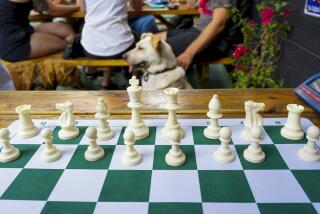Champ Predicted Foe Would Reach Top
- Share via
When Garry Kasparov lost his world championship crown Thursday, he succeeded at prophecy: Years ago, he said that Vladimir Kramnik would replace him at the top someday.
That day came sooner and more forcefully than Kasparov may have expected. Kramnik dethroned him in the Braingames Network world championship with another draw in the 15th game of the 16-game series, bringing the overall score to 8 1/2-6 1/2 and clinching victory.
Kramnik, 25, won two games and drew the rest. Kasparov didn’t win even one.
This is the first time a player has been shut out in a world championship match since 1921, when Emanuel Lasker lost to Jose Raoul Capablanca.
The chess world’s enthusiasm over Kramnik’s rise is dampened by the mystery of Kasparov’s poor form. At 37, Kasparov should be in his prime, but he played like a tired old man.
Kasparov has hinted that he has an explanation for his lethargic play and long ruminations over trivial decisions. He has pledged to reveal his reasons later.
But the score speaks more eloquently than any excuse he can muster. Kramnik defeated a foe who resembled the Kasparov of the 1980s and 1990s in name only.
The outcome can best be explained by Kasparov’s failure rather than by Kramnik’s success. Kasparov was flustered by the challenger’s surprising skill in the opening phase of the game.
As in his 1997 defeat by the IBM computer program Deep Blue, he lost faith in his own abilities.
Kramnik has been among the world’s best players since he was a teenage protege of Kasparov. A few years ago, Kasparov included Kramnik in his notorious comment about only five players knowing how to play the game. In fact, Kasparov predicted that Kramnik would replace him as champion someday.
Kramnik briefly shared the top spot on the ratings list with Kasparov in 1996 but entered this match ranked second, a substantial 79 points behind.
Will the result bring order to the chess world? Most fans will consider Kramnik the 14th world champion because he assumes the status of world’s greatest player. Kasparov has held that position since his 1985 victory over Anatoly Karpov.
A few skeptics, though, question the authority of the newly formed Braingames Network to decide the title of world champion.
The World Chess Federation, which controlled the title until Kasparov’s 1993 defection, contends this match was merely an exhibition and that Russian grandmaster Alexander Khalifman is the true champion.
Despite the shocking London results, Kramnik has yet to prove himself the strongest player in the world. Kasparov, one of the all-time greats, could easily regain his title if he regains his confidence.
Peters is an international master and writes a column on chess that appears Sunday in The Times.
More to Read
Go beyond the scoreboard
Get the latest on L.A.'s teams in the daily Sports Report newsletter.
You may occasionally receive promotional content from the Los Angeles Times.








